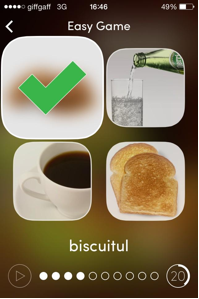Helping yourself to learn a language
Before launching into an ‘only teacher knows best’ tirade, which would sound incredibly biased as I am a language teacher myself, I would like to open with the statement that self-study is an essential part of learning a language. What happens in your classroom or with your private tutor is a good start, but anyone who tells you that this is all you have to do to learn a language is telling you a lie. Sorry about that.
 Classes are a great experience, yes, but like any new skill you want to learn, it is best to approach learning from many angles. There is no point having one lesson a week and then doing nothing at all, or, even more sinful, leaving that homework you promised yourself you would do until the night – or hour – before your next lesson. You are wasting your time and money, and yes. Us teachers can tell.
Classes are a great experience, yes, but like any new skill you want to learn, it is best to approach learning from many angles. There is no point having one lesson a week and then doing nothing at all, or, even more sinful, leaving that homework you promised yourself you would do until the night – or hour – before your next lesson. You are wasting your time and money, and yes. Us teachers can tell.
Having gone down the self-learning route myself, I’ve come across some resources I’d love to share with you.
Take for example things like Livemocha. A good all-round resource that is set up to partner you up with other language learners through language exchange, short online lessons, and lots of forums. It’s interactive, there’s always something new, and it’s free. What’s not to love?
If you don’t want to concentrate specifically on language learning and are looking for more of a language exchange/international vibe, Interpals could be the place for you. This site is a bit like a mix between Facebook and InterNations, so treat it with the same joy or disdain you do either of them. There are amazing connections to be made out there but then again there are also many to sever. Choose your friends wisely and never be afraid to use the block button with flair.
Not sure you’re ready for full-on instant message conversations just yet? Something like mylanguageexchange.com might be what you need. While both text and voice chat options are available, what I really like about this is the penpals who are happy to write either by email or even by traditional snail mail. Gifts in the post. Need I say more?
Another tool that is well worth trying is EuroTalk’s interactive series, Talk Now. This is a really easy way to pick up a good vocabulary base and I like the exposure to a lot of different accents. Yes, it is ‘staged’ because it’s a course, but if you’re concerned about who you’re speaking to out there or want to get confident first so that you can tell those with ulterior motives to ‘go away’ with perfect pronunciation, it really is a good investment.
As far as mobile apps go, I like Memrise for its simplicity. It’s sort of a drip-feed method of learning: you learn a series of words and there are ‘helpful’ memes sent in by users – I say ‘helpful’ because some really are helpful, some are hilarious so they just make you giggle, and some make you question the human race.
 Finally, there’s uTalk. This is a great time killer. All those moments sat waiting for the metro or in my case, waiting for students to finish their meetings when our lessons are due to start, can now be filled with quick and easy games to help you learn your desired language. Put down the Candy Crush, step away from the Jurassic Park Builder and pick up some new words!
Finally, there’s uTalk. This is a great time killer. All those moments sat waiting for the metro or in my case, waiting for students to finish their meetings when our lessons are due to start, can now be filled with quick and easy games to help you learn your desired language. Put down the Candy Crush, step away from the Jurassic Park Builder and pick up some new words!
Now, all these resources are tailored specifically towards learning a language. But there are other, more natural ways of learning.
Watching films in your target language but with English subtitles is an excellent way to learn, as is listening to real local radio – TuneIn is fantastic for this as it lets you search by locations the world over.
Find out about typical newspapers. In my case I used Helsingin Sanomat and found this from a quick Wiki search for ‘popular newspapers in Finland’. There will likely be an online version of your chosen paper and if you get stuck with translating you can either translate the entire page depending on your browser choice, or copy and paste the article directly into Google Translate.
Translate Eurovision entries, listen to commentary of your favourite sport in another tongue, embrace the possibility that there are songs out there in other languages that you will love – then translate and learn them by heart.
Changing the language of your social media and phone will also help, but that is for the brave and sure. Do this only if you’re confident you know enough of the language to avoid embarrassing mistakes.
Last of all, if you get the opportunity to speak, speak. If you overhear someone talking in the language you are learning, don’t be afraid to go over and say hello. Yes, perhaps you’ll startle them. But in my experience, it is just shock that a native English speaker has taken the time to bother to learn their language at all. Their first question to you will probably be ‘why are you learning…..?’
There are a million ways to learn. Try some 🙂
Kelly
Are you ever too old to learn a language?
As a small child, I was practically a real-life Harry Potter. Without the magic. Or the mean Aunt and Uncle. Okay, well really, the only similarity is that I spent a lot of my days in the cupboard under the stairs. Now, before you call the authorities, don’t worry. It was my favourite place! I had a comfy chair and my own TV and all the VHS tapes of awful 90s cartoons that a toddler could ever ask for!
 Why is this relevant to EuroTalk I hear you ask?! Well, it was here, sat watching Tots TV, that I accidentally taught myself French! My parents had no idea, until one day I casually said to my Mum ‘Bonjour, Je m’appelle Codie! That means “Hello, my name is Codie”, Mummy!’. She was in shock. After all, what would you think if your three year old daughter started spouting French? Once I’d explained that I got it from Tilly (sorry to anyone born too early/late to understand the references here, YouTube it!), I was inundated with French books, tapes and excited relatives. Even the nurse at our local GP practice heard about my weird knowledge and insisted on making me count to ten in French whilst she gave me my injections. I was essentially a performing monkey – but I loved it!
Why is this relevant to EuroTalk I hear you ask?! Well, it was here, sat watching Tots TV, that I accidentally taught myself French! My parents had no idea, until one day I casually said to my Mum ‘Bonjour, Je m’appelle Codie! That means “Hello, my name is Codie”, Mummy!’. She was in shock. After all, what would you think if your three year old daughter started spouting French? Once I’d explained that I got it from Tilly (sorry to anyone born too early/late to understand the references here, YouTube it!), I was inundated with French books, tapes and excited relatives. Even the nurse at our local GP practice heard about my weird knowledge and insisted on making me count to ten in French whilst she gave me my injections. I was essentially a performing monkey – but I loved it!
Fast-forward a few years later and I’m in the second half of Primary School. We have a super cool substitute teacher who plays guitar and teaches us German. It takes him less than half an hour to teach an entire class of children to count to ten in German and 15 or so years later I still know it.
Fast-forward a few years even later and my adorable four year old nephew is counting to ten in Japanese! Something they learn at pre-school through the use of cute mnemonic devices (with even cuter actions!). Languages are being taught younger and younger and suddenly, my toddler French seems a whole lot less impressive.
 So that leads me to wonder, am I too old to learn a language? I’m led to believe that the older you are, the harder it is to learn an instrument (well, at least I can sort of play the recorder, right?), so does this apply for other skills? I can’t do a cartwheel, so I figure that boat has sailed, but I did recently learn how to knit… badly. Do different things have different cut off points? As knitting is usually for old ladies, was I only able to learn it because I’m cracking on a bit now? (Maybe a slight exaggeration, I am only 23 after all.) Most importantly am I the right age to finally start learning a language? As I’m currently childless, I know it’s my biological clock I should be worried about, but I genuinely think it is being drowned out by the voice in my head that is yelling ‘What happened to the girl who was learning French before she could tie her shoes? What are you doing with your life?!’.
So that leads me to wonder, am I too old to learn a language? I’m led to believe that the older you are, the harder it is to learn an instrument (well, at least I can sort of play the recorder, right?), so does this apply for other skills? I can’t do a cartwheel, so I figure that boat has sailed, but I did recently learn how to knit… badly. Do different things have different cut off points? As knitting is usually for old ladies, was I only able to learn it because I’m cracking on a bit now? (Maybe a slight exaggeration, I am only 23 after all.) Most importantly am I the right age to finally start learning a language? As I’m currently childless, I know it’s my biological clock I should be worried about, but I genuinely think it is being drowned out by the voice in my head that is yelling ‘What happened to the girl who was learning French before she could tie her shoes? What are you doing with your life?!’.
And that, my friends, is the existential crisis that has inspired me to try and learn Japanese, with the help of EuroTalk. Maybe I’ll shut myself in the cupboard under the stairs for old times’ sake!
Codiekinz is a twenty-something blogger from the South, currently masquerading as a Northerner. She makes YouTube videos and posts about life, books, travel and her bearded dragon, over at www.codiekinz.co.uk. She’ll also be using uTalk to learn Japanese, so keep an eye on her blog for updates!
You can also follow her on Twitter @CodieKinz
Photo credit: codiekinz.co.uk
Are translation apps really the answer for travellers?
The first thing you need to do before embarking on a trip to a foreign land is to start learning the language. This will not only impress the locals, but will also make your visit easier and more enjoyable. In this hectic era, however, you may be forgiven for not dedicating the time necessary for learning a new language. In such instances, one might rely on a translation app to help fill in the gaps in your knowledge. But are these apps really an alternative to learning the language?
Of course you will continue to learn a lot while you are abroad. Simply engaging in conversation and navigating the signs and menus will put your skills to the test and improve them in the process. You can use any spare time to enhance your language learning with apps like uTalk. It’s a handy way to learn 111 languages while you’re on the move.
 If you are really stuck though, and haven’t managed to learn anything but a few basic phrases, then you may turn to a different kind of app. iOS, Android and Windows Phone all offer some great apps for translating speech in real time. It’s the sort of technology that was previously associated with science fiction, but now you can download it for free. The Google Translate app is one of the most popular real-time speech translation apps for Android and iOS, and it works in 50 languages. Skype also launched a real time translation option recently, and although it is probably the most advanced in terms of technology, it’s only available in two languages at present. Technology like this will inevitably change the way we think about global travel.
If you are really stuck though, and haven’t managed to learn anything but a few basic phrases, then you may turn to a different kind of app. iOS, Android and Windows Phone all offer some great apps for translating speech in real time. It’s the sort of technology that was previously associated with science fiction, but now you can download it for free. The Google Translate app is one of the most popular real-time speech translation apps for Android and iOS, and it works in 50 languages. Skype also launched a real time translation option recently, and although it is probably the most advanced in terms of technology, it’s only available in two languages at present. Technology like this will inevitably change the way we think about global travel.
I have tested many of these apps and have found that they can be a godsend when you are searching for that one elusive word to help you get your point across. You can also try to convince a bewildered local to speak into the phone in the hopes that the voice recognition software and the translation software work well enough to produce a coherent sentence. Unfortunately such apps are still a long way from perfect, as factors such as regional dialects and background noise can seriously impact the quality of the translations.
There are also practical problems posed by using a translation app in a restaurant or train station. You shouldn’t be surprised to hear irritated grunts of derision from locals, especially if there is a queue behind you. That’s why far from being a substitute for language learning, these apps are at best a means to supplement a traveller’s existing language skills.
At first such groundbreaking technology seems as though it holds the revolutionary potential to knock down language barriers and make language learning redundant. But although the level of technology available now is far beyond what it was a decade ago, there’s still plenty of room for improvement. It takes a human mind to understand the nuances of language and intended meaning. These apps might be great for ordering food on holiday, but you can’t use them to have meaningful conversations or to translate literature. The day such apps finally make language learning redundant will be the same day that translation technology replaces professional translation services.
Author biog: Tom Rowsell is a writer and language enthusiast from East London. His fascination with language began while studying Old English literature at University.
The uTalk language challenge – how did you do?
The uTalk language challenge for January comes to an end on Saturday, and we’ve loved hearing about everyone’s progress! Check back here next week to see how we all got on here in the office (trust me, you won’t want to miss that), but in the meantime, we asked a few of our most enthusiastic competitors to tell us how they got on.
Has anyone else taken part in the uTalk challenge? Did you enjoy it, and most importantly will you be continuing with your new language? We’d love to hear from you, so please share in the comments 🙂 And if you missed it this month, it’s never too late to start – uTalk is available from the App Store, and you can start learning your first essential words completely free.
Don’t miss our February photo challenge, which kicks off on Sunday!
Now over to our uTalkers 🙂
Ingrid, learning Serbian
I’ve really enjoyed doing the challenge. Serbian is a language I’ve wanted to get to grips with for a long time for quite a bizarre reason (it involves a love of the Eurovision Song Contest!) but I haven’t really known where to start.
The app’s been great, although I’d recommend using it on an iPad rather than an iPhone if you can. Oh, and the range of languages available is amazing!
It’s been slow-going – well it’s a tricky language! – I tried to do some in my lunch-break and on my commute but it was generally too noisy to concentrate. I have a trip to Belgrade planned for early April and it would be so nice to communicate on even the most basic level in their own language, so I’ll definitely be keeping it up.
Patricia, learning Icelandic
My name’s Patricia and I’m from Montreal, Canada. I’m the happy owner of a wonderful Icelandic horse, Léttfeti. I’ve been riding Icelandic horses for four years and I’ve been to Iceland. And I absolutely love Björk 🙂 I took up the uTalk challenge so I could begin to learn more about the Icelandic Horse breed, about Icelandic riding and about Iceland in general. I hope to go back there soon.
The uTalk app is a whole lot of fun, filled with useful words and phrases. I particularly enjoyed repeating the words and phrases after the native speakers and then hearing my own voice. What a great tool to gain confidence and improve pronunciation! I also really liked the Iceland module, which contained many words and phrases pertaining to things that are specific to Iceland.
The app is very visually pleasing. It works offline, which is great for learning on planes, subways and other areas without internet. This app can also be used as an offline dictionary, which I find particularly useful. Thank you for this opportunity and I’m looking forward to the next Challenge!
@EuroTalk I’m getting the hang of it! The Icelandic pronunciation is so much fun! #NewYearNewuTalk pic.twitter.com/znHaX1hNy6
— Patricia Ochman (@speedbird_o) January 20, 2015
Alex, learning Romanian
I found it really fun learning some basic Romanian, especially because I’ve been able to greet Ioana each day saying ‘Buna Ziua’, and trying out a few random words on her. I found the speaking and recall games the most useful as you can check you actually know the words, rather than passively recognising them. The memory game, on the other hand, is the bane of my life as I always manage to forget where one thing is and miss the full score. Overall, I’ve found uTalk really fun and easy to use at the gym while I’m on the bikes or during my lunchbreak.
Jacqui, learning Croatian
I first discovered EuroTalk when my children were involved in the Junior Language Challenge in 2010, and, as a language graduate, was very impressed with how easy it was to master the basics. Since then, I have never quite prioritised the time to learn a new language myself, so when I heard about this month’s challenge for adults, it was just a matter of picking which one to try.
Why Croatian? It’s a country I quite fancy visiting, and as I’ve never attempted a Slavic language before, it seemed like a worthy contender for the challenge. Come 1st January, it soon became clear to me that Slavic languages do not have much immediately in common with either Romance or Germanic ones, and it often felt more like a string of tongue-twisters with some different accented letters to add into the mix for good measure. Daunting, yes, but I wasn’t going to let it beat me. I discovered that standing in the middle of the room and declaiming the words in theatrical fashion was quite effective!
After a month, I’ve made great progress. I haven’t earned maximum points (I’m on just over 4000), but I have managed to learn a lot more than I thought I would, even waking up some mornings with various phrases springing to mind! This achievement wouldn’t have been possible without something like the uTalk app. The approach of listening and repeating with a few simple games just works at this level of language acquisition.
The good news for me is that I’ve now booked a short break to Croatia in the summer – make mine a ‘čaša šampanjca, molim vas’.
Katherine, learning Czech
I chose to learn Czech as it was a completely new language to me, and I will be visiting there later in the year, so it will be fun to try out a few phrases!
I have found the app quite addictive – as soon as I’ve got a good score in one topic I want to get started on another one! The games really help you to learn quickly, and although I can’t pretend to remember every word, it will be easy to brush it up again later. So, a great challenge, and good fun!
My uTalk Romanian journey so far
Having a look at the uTalk challenge scoreboard in the EuroTalk office, it looks like I’m some way behind with my Romanian learning. But I haven’t give up yet! Here’s what I’ve learned so far about this language.
1. It’s a lot like Italian
This is very helpful for me, as I already understand a reasonable amount of Italian (even if it’s only from watching too many episodes of Inspector Montalbano…), so words like ‘la rivedere’ (goodbye, like the Italian arrivederci), ‘buna seara’ (good evening, like buona sera in Italian) and many colours and adjectives are very similar (‘urata’, ugly, sounds like the Italian word brutta, and many others like ‘plin’/pieno, ‘trist’/triste, ‘rapid’/rapido, ‘negrul’/nero or ‘verdele’/verde). Numbers are also very close to those in Spanish or Italian.
2. Sometimes you can make words just by adding ‘ul’ to the end
Ioana helpfully informs me that this is just the masculine ‘the’ (the feminine is ‘le’), but it still seems like a reliable strategy to guess words. After words such as ‘trenul’, ‘aeroportul’, ‘pasaportul’, ‘doctorul’ and my personal favourite ‘biscuitul’, I started guessing other words like ‘vinul’ (correct!) and ‘mapul’ (sadly incorrect), which occasionally works.
3. The speaking game is really fun and addictive, and probably the best way to learn
I don’t know about other people, but for me, producing the language is the key to remembering it. So, speaking or writing the language is key. Repeating the phrases and then using my own recordings to identify the pictures is weirdly fun and helps me to remember better than simple guessing of pictures in the easy or hard games, which encourage recognition but not reproduction. Of course the ultimate test is the recall game, where you have to remember and say the word or phrase yourself and then check it. These games can take a while to get 100% on, but are an excellent tool.
4. You have to learn to make some brand new sounds
Romanian has a few fun letters that we don’t have. ‘â’ (with a little hat) sounds like an ‘uh’, not an ‘a’ at all. So ‘Cât e ceasul?’ (what’s the time) isn’t pronounced how it looks to English speakers, but like ‘Cuht e chassul’, because the â is a different letter, and ce is a ‘ch’ sound like in Italian. It also has a funny ‘I’ which looks like this: î and sounds like another ‘uh’, which is difficult to describe. This sound is in words like ‘închis’ (closed) which sounds more like ‘unkees’. These sounds are pretty fun to pronounce if you ask me, and Ioana says I sound ok, which I put down to repeating after the native speakers in uTalk.
5. They invented crazy words for vegetables that make no sense!
Ok, maybe that’s a bit harsh, but my knowledge of French, Spanish, Italian, English and German can’t help me when it comes to learning the names of vegetables that have names like ‘bamele’, ‘ardeiul’, ‘porombul’ and ‘varza’, which don’t relate to any language I know. They can’t even call zucchini zucchini: it’s actually ‘dovleceii’.
Somehow I don’t think I’m going to beat Nat in the uTalk challenge, but I’m having fun with Romanian anyway!
Alex
(Editor’s note: it turns out nobody could beat Nat, who completed the challenge in Icelandic a couple of days ago. She’s now considering which language to learn next – any suggestions?)


